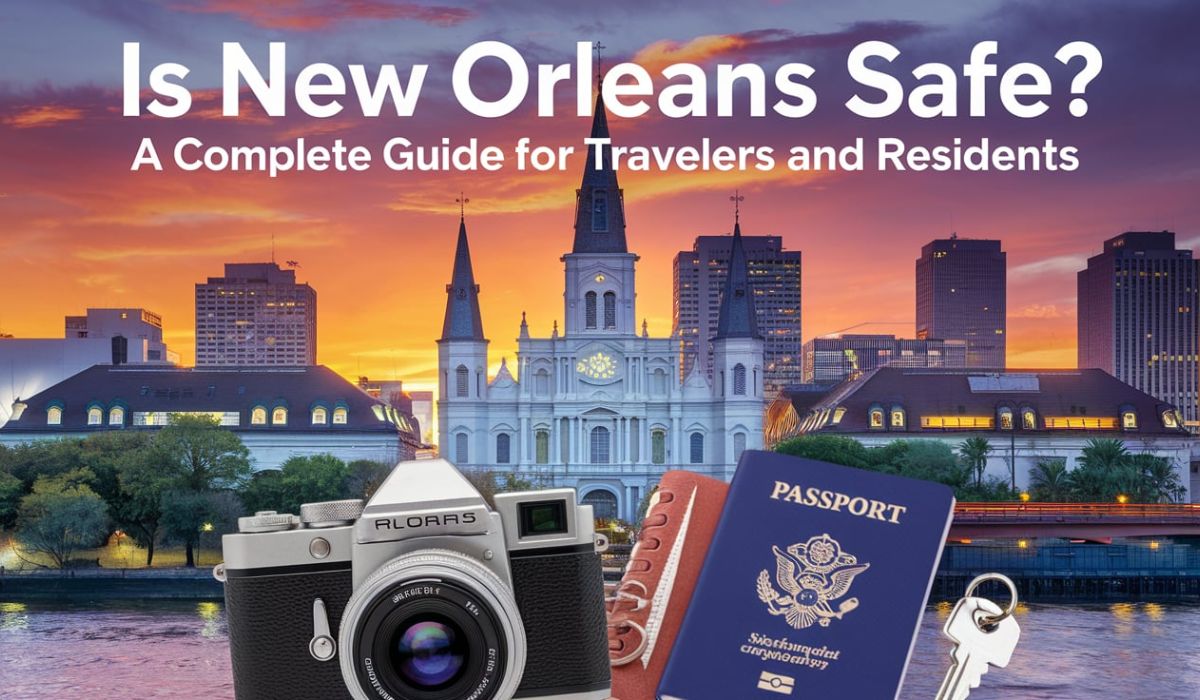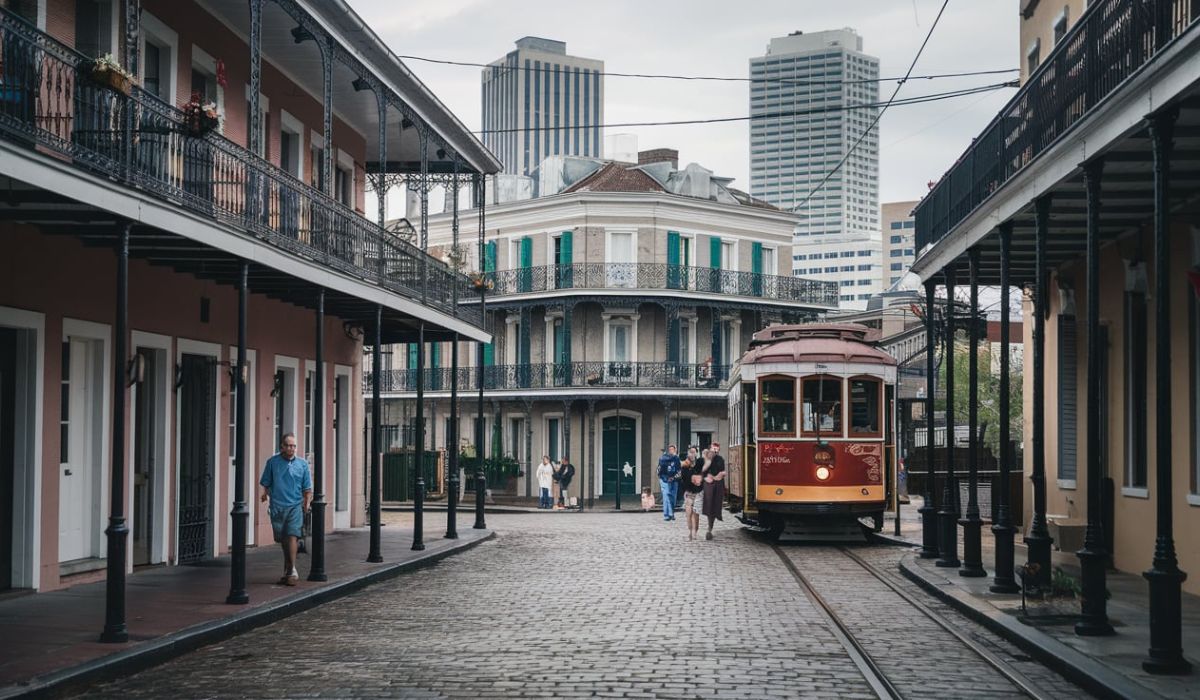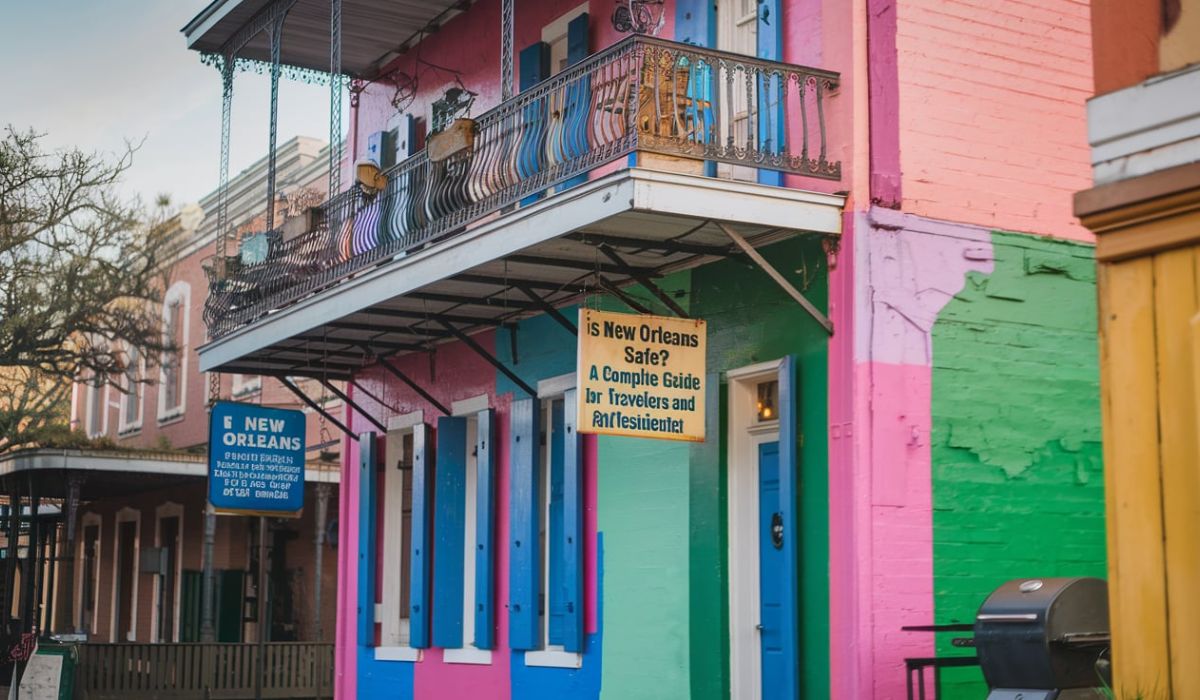New Orleans is a city known for its vibrant culture, delicious cuisine, historic architecture, and unique music scene. But when planning a visit or considering moving there, you might be asking yourself, “Is New Orleans safe?“ It’s a valid question, especially when traveling to a city that is as dynamic and diverse as the Big Easy.
In this article, we will address safety concerns, share tips on how to stay safe, and provide insights into the city’s safety statistics. Whether you’re planning a vacation, thinking about relocating, or just curious, this guide will help you get a better understanding of New Orleans’ safety.
Introduction: Understanding New Orleans’ Safety

When you think of New Orleans, the first images that come to mind might be colorful Mardi Gras parades, lively jazz performances, and the delicious scent of gumbo wafting from restaurants. However, like any large city, New Orleans has its fair share of safety concerns that potential visitors and residents must consider.
The question “Is New Orleans safe?” is often posed by travelers who are unsure about the city’s safety due to news stories and hearsay. While New Orleans does have some areas that are best avoided, many parts of the city are perfectly safe, with millions of tourists visiting every year without incident.
Let’s dive deeper into what you should know about safety in New Orleans.
Safety in New Orleans: What You Need to Know
New Orleans is a city that thrives on tourism, but like any major urban area, there are safety concerns. In 2023, New Orleans ranked high in crime statistics, particularly property crimes and violent crimes. However, it’s important to remember that not all neighborhoods in New Orleans are dangerous, and many are quite safe for visitors and residents alike.
Crime rates can vary dramatically between neighborhoods. Some areas have heavy tourist traffic and are safer, while others are known for higher crime rates. The key to staying safe in New Orleans is knowing where to go, what precautions to take, and how to stay alert.
Crime Statistics in New Orleans

Like many cities, New Orleans has a complex relationship with crime. The city has historically ranked as one of the top cities for crime in the United States, particularly in terms of violent crimes such as homicide and armed robbery. In recent years, however, efforts to improve law enforcement and community engagement have led to decreases in certain types of crime.
Here’s a quick overview of crime trends:
- Violent Crime: New Orleans experiences a relatively high rate of violent crime, including homicides and aggravated assaults.
- Property Crime: Property crimes like theft, burglary, and car break-ins are also common, particularly in tourist-heavy areas.
- Tourist Areas: While tourist areas are generally safe, petty crimes such as pickpocketing and bag snatching can occur.
While these statistics might sound concerning, it’s important to keep in mind that millions of tourists visit New Orleans each year without experiencing crime. Being vigilant and knowing where you’re going can significantly reduce your risk.
Neighborhoods to Avoid for Safety
Not all neighborhoods in New Orleans are equally safe, and certain areas are known for higher crime rates. It’s wise to research the neighborhoods before you visit. Here are a few areas that are typically considered higher-risk:
- St. Roch – Known for higher rates of violent crime.
- Treme – While it’s rich in culture, this neighborhood has had crime concerns.
- Bywater – Though it’s undergoing gentrification, it’s still known for property crimes.
It’s important to note that these neighborhoods have been undergoing changes, and some areas are seeing improvements. However, visitors should be cautious and avoid walking around late at night in unfamiliar areas.
Best Neighborhoods for Safety in New Orleans

While some neighborhoods have safety concerns, many parts of New Orleans are quite safe and welcoming to visitors. These areas are ideal for tourists and residents looking for a sense of security:
- The French Quarter: The most famous neighborhood in New Orleans, it’s generally safe due to heavy police presence. Still, take care with your belongings.
- Garden District: Known for its beautiful historic homes and tree-lined streets, the Garden District is a safe area, ideal for walking and exploring.
- Uptown: An upscale residential area with a low crime rate, Uptown is also home to Tulane University and Loyola University.
- Marigny: Close to the French Quarter, this hip neighborhood offers a vibrant music scene and is relatively safe during the day.
Choosing accommodations or staying in these safer areas will help you enjoy your time in New Orleans with peace of mind.
Is the French Quarter Safe?
The French Quarter, one of New Orleans’ most iconic neighborhoods, is generally safe, especially for tourists. It is heavily patrolled by law enforcement, and its popularity ensures that there’s always activity and crowds around. However, it’s important to stay alert, as pickpockets and petty thieves may target distracted visitors.
To stay safe in the French Quarter:
- Avoid dark alleys or empty streets at night.
- Keep your personal belongings secure and avoid showing expensive items like jewelry.
- Stick to well-lit areas when walking at night.
Tips for Staying Safe While Visiting New Orleans
Whether you’re exploring the city during the day or venturing out at night, here are some practical safety tips to help you enjoy your visit:
- Use trusted transportation: Stick to official taxis, rideshare services like Uber or Lyft, or the streetcars for safe transport.
- Be aware of your surroundings: Keep your phone and wallet in front pockets, and avoid looking distracted or lost.
- Stay in groups: If possible, explore with friends or family, especially at night.
- Research local events: Some events, such as parades or festivals, can draw large crowds and have a higher risk of petty theft.
Following these simple guidelines can help you have a safer experience while still enjoying all that New Orleans has to offer.
How to Avoid Common Scams in New Orleans
Like many tourist-heavy cities, New Orleans has its fair share of scams. Some common ones include:
- Street Performers and Beggars: While many street performers are legitimate, there are also scammers who aggressively ask for money.
- Phony Charity Requests: Be cautious of people asking for donations on the streets, especially in tourist areas.
- Hotel Scam: Always confirm the price and details before booking a hotel. Some scam artists may try to trick tourists with fake deals.
To avoid these scams, use common sense and remain cautious when approached by strangers.
Safety in New Orleans During Mardi Gras
Mardi Gras is one of the most exciting times to visit New Orleans, but it can also be chaotic. With large crowds and lots of alcohol, it’s important to plan ahead to stay safe during the festivities:
- Stay hydrated and eat regularly to avoid overconsumption of alcohol.
- Stick with friends and set meeting points in case you get separated.
- Beware of the crowd: Keep your belongings secure, and avoid risky behaviors.
If you follow these guidelines, Mardi Gras can be a fun and memorable experience without compromising your safety.
New Orleans’ Crime Prevention Efforts
The city of New Orleans has been working to address its crime issues with several initiatives, such as:
- Increased police presence in tourist-heavy areas like the French Quarter.
- Community engagement programs aimed at reducing violence and building trust.
- Efforts to reduce property crime through neighborhood watch programs and surveillance cameras.
These initiatives show that New Orleans is actively working to improve safety and reduce crime rates, making the city safer for both locals and visitors.
How Safe is New Orleans for Solo Travelers?
Traveling solo in New Orleans can be safe, but it requires taking extra precautions. Solo travelers should be especially cautious at night and avoid unfamiliar areas. Stick to well-populated, well-lit streets and avoid excessive alcohol consumption. If you’re traveling alone, consider staying in well-populated neighborhoods like the French Quarter or Garden District.
Transportation Safety in New Orleans
Getting around New Orleans is fairly easy, but like in any city, it’s important to prioritize safety:
- Streetcars are a fun and safe way to explore the city.
- Uber or Lyft are great alternatives to taxis, especially if you’re traveling late at night.
- Walking: Stick to busy areas and avoid walking alone late at night in poorly lit neighborhoods.
Local Emergency Contacts and Services
It’s always a good idea to know emergency contacts when traveling to a new city:
- Police: 911 or 504-821-2222
- Fire Department: 911
- Ambulance: 911
What Locals Say About Living in New Orleans
Many locals love the charm, culture, and uniqueness of New Orleans. However, they also stress the importance of being aware of your surroundings and taking necessary precautions, especially at night. While the city does have some crime, it’s also full of vibrant neighborhoods, friendly people, and amazing food, making it a great place to visit or live for those who stay vigilant.
Conclusion: Weighing the Pros and Cons of New Orleans Safety
When asking “Is New Orleans safe?”, the answer depends on your approach. While the city has areas that are safer than others, millions of tourists visit each year without incident. By staying aware, following safety tips, and sticking to well-populated areas, you can enjoy all the beauty and culture that New Orleans has to offer while minimizing risks.
FAQs
Is it safe to visit New Orleans for the first time?
Yes, with proper precautions, New Orleans is safe for first-time visitors.
What areas in New Orleans are the safest?
The French Quarter, Garden District, and Uptown are some of the safest neighborhoods in New Orleans.
How can I stay safe during Mardi Gras in New Orleans?
Stay hydrated, keep your belongings secure, and avoid large crowds after dark.
Are there any neighborhoods in New Orleans I should avoid?
Some neighborhoods to be cautious about include St. Roch and Treme, especially at night.
How can I avoid scams in New Orleans?
Be cautious of street performers, beggars, and fake charity requests while in tourist areas.
For More Visit, rankshort
